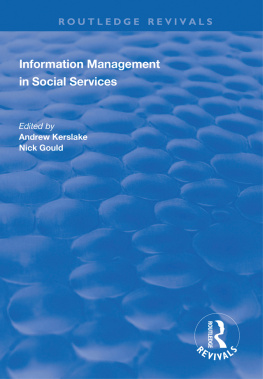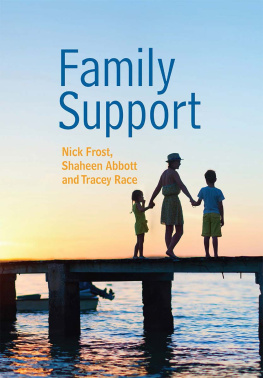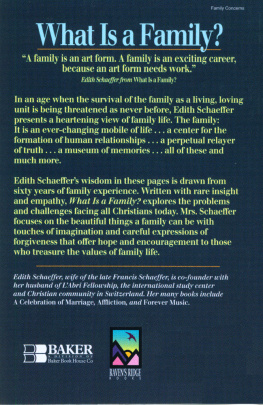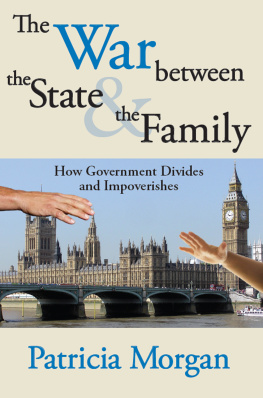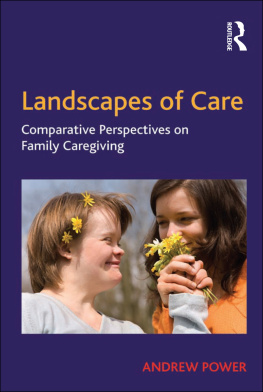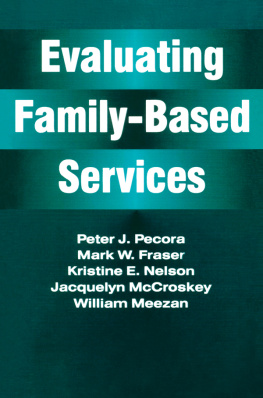Family Support and Family Centre Services
Family Support and Family Centre Services
Issues, Research and Evaluation in the UK, USA and Hong Kong
Andrew Pithouse
School of Social and Administrative Studies
University of Wales
College of Cardiff
Sarah Lindsell
Guilford Action for Community Care
Monit Cheung
Graduate School of Social Work
University of Houston
First published 1998 by Ashgate Publishing
Reissued 2018 by Routledge
2 Park Square, Milton Park, Abingdon, Oxon OX14 4RN
711 Third Avenue, New York, NY 10017, USA
Routledge is an imprint of the Taylor & Francis Group, an informa business
Copyright A.Pithouse, S. Lindsell and M. Cheung 1998
All rights reserved. No part of this book may be reprinted or reproduced or utilised in any form or by any electronic, mechanical, or other means, now known or hereafter invented, including photocopying and recording, or in any information storage or retrieval system, without permission in writing from the publishers.
Notice:
Product or corporate names may be trademarks or registered trademarks, and are used only for identification and explanation without intent to infringe.
Publisher's Note
The publisher has gone to great lengths to ensure the quality of this reprint but points out that some imperfections in the original copies may be apparent.
Disclaimer
The publisher has made every effort to trace copyright holders and welcomes correspondence from those they have been unable to contact.
A Library of Congress record exists under LC control number: 97078098
ISBN 13: 978-1-138-31077-3 (hbk)
ISBN 13: 978-0-429-45920-7 (ebk)
The authors wish to express their thanks to those parents and children, family centre staff and agencies who participated in the research projects which have informed this book. We are very grateful indeed to Mary Hibbs and Jan Stephens, both Research Associates in the School of Social and Administrative Studies, Cardiff University for their unstinting advice and support in the completion of this text. Similarly, our sincere thanks go to Mr Alfredo Tijerina of the Family Service Centre in Houston for his very helpful comments. We are particularly indebted to Professor C. K. Law, Head of Social Work at the University of Hong Kong, Mr Timothy Leung, Training Officer and Mr Felix Choi, Research Officer, both of the Family Welfare Society, who provided valuable material on family centre practice in Hong Kong.
Monit Cheung is an Associate Professor at the University of Houston Graduate School of Social Work. She is a faculty member of the Texas Children's Protective Service Training Institute. Dr Cheung has an international research record and is often invited by government in Hong Kong, China and the US to conduct training programmes for social services and law enforcement professionals. Her interests include child abuse, family therapy, immigrant issues and services for older people.
Sarah Lindsell is manager of a large voluntary agency in Surrey which provides community care for adults and family centre provision for children and parents. She has a well developed career in direct service provision and in service evaluation. She has been a researcher in welfare at Cardiff University and at the London School of Economics. Her main interests are in action research, service monitoring and review, and service development.
Andrew Pithouse lectures in Social Work at Cardiff University and also chairs the Social Welfare Research Unit which conducts national and international studies in child care, community care and social work evaluation. His areas of specialist interest are organisational analysis, social work management and service appraisal.
The aim of this book is to identify and explore key themes and issues around a relatively unresearched realm of welfare practice in child and family social work - that is, family centre services and related community based types of provision. We shall go on to define what we mean by family centres shortly, but for the purposes of introduction we mean a physical setting where parents and children attend to take part in activities which seek to enhance child, family and community life. Such activities, typically organised or promoted in some way by paid staff, also take place in other parts of a local community and in the homes of local people as well. We shall be looking, inter alia, at intensive family services that are centre-based and we shall also give some consideration to out-reach services from family centres including any that are intensive and/or therapeutically focused towards children and parents. Our use of the term 'family centre' encompasses a range of UK provision and also includes family service centres as they are often termed in Hong Kong and the USA. Family service centres have been around for many years in the US and provide a range of family provision, but most typically have offered home-based services to families where issues of protection or family preservation have been prominent (see Frankel 1988, Wells and Biegel 1991). We look briefly at some of the US family service centre models aware that they are often less 'centre oriented' and more 'family centred' than UK variants, nonetheless their practices and problems as a system of welfare delivery may be instructive to a relatively new and rapidly growing family centre movement in Britain. We recognise that some UK commentators (Lloyd 1997, pp. 144 and 154) prefer to use the term 'centre-based family support' to signify the importance of a physical location which contains multiple functions, the sum of which are thought to provide a 'synergy' beyond their separate parts. We mention this now to point up the significance of the term 'centre' as a defining element within a conceptual field that owns few (and sketchy) typologies to illustrate the major types of family centre and related practices. As we shall see in later chapters, there are evident similarities and important distinctions between centres in Britain, America and Hong Kong. The book will draw on our own and other research and in so doing we hope to provide something of a cross national perspective that can help generate new ideas and useful insights and can guard against some unduly narrow or eurocentric view, of what best serves the interests of children and families.
It is not our intention to rehearse material that already exists in a small but growing body of empirical and practice oriented literature on UK family centres. Thus, we shall not for example address in any detail the types of social work methods practised in family centres, or the knowledge and skills informed by the UK legislative base upon which such centres operate, or discuss broader social policy on family needs which have influenced the development of family centres. Such approaches have already been developed to impressive effect by, respectively, Stones (1994), Warren (1993) and Cannan (1992). Likewise, we shall not dwell overly on concepts and definitions of family centres, this has already been the subject of much unfinished debate (DeAth 1989, Warren 1986). Rather, we wish to address matters of more pressing concern such as the limits and potential of family centres and allied provision to preserve the family, to protect children and to enhance neighbourhood well-being. Similarly, key questions about service effectiveness will be raised together with related issues and ideas about evaluation.




